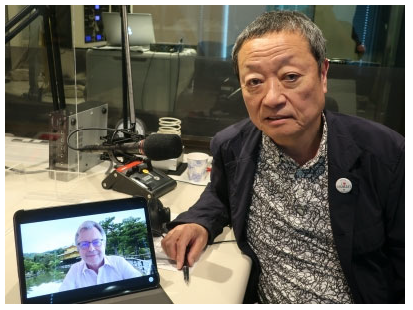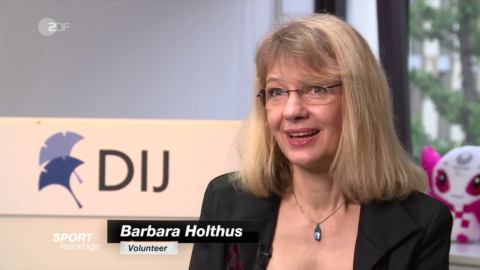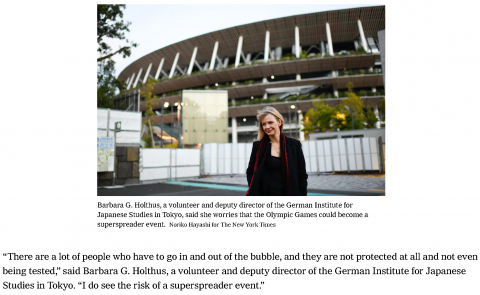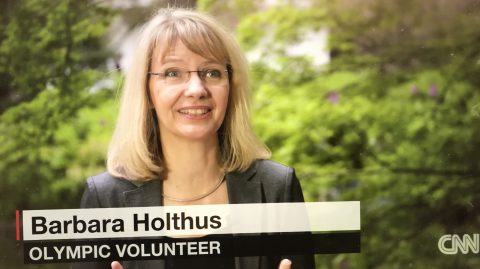Events and Activities
“Sophistication with understatement” – Franz Waldenberger interviewed on Japanese radio

DIJ director Franz Waldenberger shared his views on Japanese and German society in an interview series with Oguro Kazumi, the host of Lohas Talk on J-Wave radio. Franz introduced the institute, its research, and his own interests in Japanese society and economy. He revealed that he had a “positive culture shock” when he first came to Japan and that he was impressed with the unique “atmosphere”, importance of “human relations”, and “politeness”. The talk also touched upon women in politics, work-style, and work-life-balance. “In Germany, above all result matters but in Japan people are praised for their efforts”, he observed. On energy politics, Franz criticized that calculations of the costs of nuclear energy in Japan usually omit the costs for the disposal of nuclear waste. He praised the appeal of Japanese culture which, however, the Japanese themselves did not promote enough due to their attitude of “sophistication with understatement”. An audio file of the talk (in Japanese) is available here.
“No word on vaccines, no testing at all.”

Several international media have interviewed DIJ deputy director Barbara Holthus about Olympic volunteering and the risks of holding the Tokyo Olympics amidst the ongoing pandemic. Barbara appeared on the Canadian broadcaster CBC’s News Morning Show (video), the Australian news programme Ticker News (video), and CNN’s news show The Lead (video). Barbara criticized the lack of vaccination opportunities for volunteers and said that it was too dangerous to hold the Olympics this year. Barbara was also interviewed by German news agency DPA and her statements appeared in several German news outlets, including Zeit online and FAZ online (in German). For more information on research related to the Olympics, see the DIJ’s special project on the Tokyo Olympics and the open access book publication Japan Through the Lens of the Tokyo Olympics.
What remains of the Tokyo Games? DIJ researchers at INEAST East Asia Day
 DIJ deputy director Barbara Holthus and principal researcher Torsten Weber will participate in this year’s online INEAST East Asia Day at Duisburg-Essen University on June 11. The event “NOlympia? The Tokyo Games and what remains of them” will discuss the fate of the world’s biggest sports festival in times of a pandemic. Other participants are Katharina Bauernschmidt (Paracanoeist, Team Germany Paralympics) and Martin Fritz (Japan-based journalist and author). The event will be moderated by DIJ alumnus Axel Klein (Professor for Social Sciences of East Asia/Japanese Politics, Duisburg-Essen University). Details and registration here
DIJ deputy director Barbara Holthus and principal researcher Torsten Weber will participate in this year’s online INEAST East Asia Day at Duisburg-Essen University on June 11. The event “NOlympia? The Tokyo Games and what remains of them” will discuss the fate of the world’s biggest sports festival in times of a pandemic. Other participants are Katharina Bauernschmidt (Paracanoeist, Team Germany Paralympics) and Martin Fritz (Japan-based journalist and author). The event will be moderated by DIJ alumnus Axel Klein (Professor for Social Sciences of East Asia/Japanese Politics, Duisburg-Essen University). Details and registration here
New on YouTube: Roundtable ‘Belt and Road Initiative as Method’

What are broader theoretical implications of China’s Belt and Road Initiative (BRI)? Members of the Max Weber Foundation Research Group on Borders, Mobility and New Infrastructures convened the Roundtable Discussion ‘BRI as Method: Forging Theoretical Agendas’ to discuss the significance of China’s controversial project for the geography of knowledge production. A video of the event is now available on the DIJ’s YouTube channel, including links to the abstracts of the papers by the panelists Tim Bunnell, Yang Yang (both ARI), Darren Byler, Tim Oakes (both University of Colorado Boulder), Chong Ja Ian, and Woon Chih Yuan (both NUS). The panel was convened by Shaun Lin, Naoko Shimazu, and James D Sidaway. The research group, located at the NUS in Singapore, was founded in 2017 and is supported by the DIJ and the Max Weber Foundation. More information here.
“There is a great danger that the Olympics will become a superspreader event”

German TV ZDF visited the DIJ to interview deputy director Barbara Holthus about the increasing criticism of the Tokyo Olympics. “There is a danger of the Olympics becoming a superspreader event”, Barbara said. Her comments were broadcast in the ZDF Sport Reportage (23 May 2021) and can be viewed online. Barbara was also interviewed by German radio DLF about the potential cancellation of the Games. She said that she sees only a ten per cent chance for cancellation. “Monetary interests and the power of the IOC are too strong after all.” In addition, Barbara’s recent interview with German news agency SID on Olympic volunteers can now be viewed on the DIJ’s YouTube channel. For more information on research related to the Olympics, see the DIJ’s special project on the Tokyo Olympics and the open access book publication Japan Through the Lens of the Tokyo Olympics.
DIJ expertise on Tokyo Olympics in international media

DIJ director Franz Waldenberger and deputy director Barbara Holthus have been quoted in several German and international media about recent developments regarding the Tokyo Olympics and their potential cancellation. In an interview with German radio DLF, Franz Waldenberger commented on the merits and demerits of a cancellation of the Games for Japanese companies. “If they have made advance payments, then they are now in a bad situation”, he explained. In a live interview with Korean TV Arirang’s News Center, Barbara Holthus argued that “the Games should not be held at this time, in the midst of a pandemic, at a time when really the whole world is suffering”. In the Daily Mail, she emphasized that holding the Games now was a “recipe for disaster” and that she was “very scared for the country and for the people of Japan”. For the German news agency SID and the news site Tagesschau, she explained the risks for Olympic volunteers and the general public. “There is a danger that the Games will become a superspreader event”, she commented. For more information on research related to the Olympics, see the DIJ’s special project on the Tokyo Olympics and the open access book publication Japan Through the Lens of the Tokyo Olympics.
Barbara Holthus quoted in New York Times and Mainichi Shinbun

“I do see the risk of a superspreader event,” says Olympic volunteer and DIJ deputy director Barbara Holthus in an interview with the New York Times. In the article How Can the Olympics Protect 78,000 Volunteers From the Coronavirus? (May 2), she explains that Olympic volunteers are told to disinfect their hands, keep distance to visitors, and wear a mask. But they are also asked to address visitors with smiles and hospitality. “I find that very insensitive”, she comments. Barbara is also quoted in the Japanese daily Mainichi Shinbun (April 30), where she comments on the risks of holding the Games during the pandemic, and she is featured in the Mainichi‘s series “What to do with the Olympics” (May 14). For more information on research related to the Olympics, see the DIJ’s special project on the Tokyo Olympics and the open access book publication Japan Through the Lens of the Tokyo Olympics.
Barbara Holthus interviewed about Olympic volunteers

Three months before the scheduled opening of the Tokyo Olympics, DIJ deputy director Barbara Holthus was interviewed by Japanese and international media about Olympic volunteers. In Fuji TV’s news show ‘Viking More’, Barbara explained that volunteers are provided only with insufficient measures to protect against a Covid infection. There are also neither PCR testing nor vaccinations planned for volunteers. In the Japanese daily Mainichi Shinbun, she commented that the Games should not be held in the midst of the pandemic as they would neither have the expected economic impact nor create a positive legacy. Barbara also appeared on a CNN TV programme which was broadcast 100 days before the scheduled opening of the Games on April 14. What was meant to be a “once-in-a-lifetime” opportunity has now turned into “a really dangerous experience,” she said. The video can be viewed here. For more information on research related to the Olympics, see the DIJ’s special project on the Tokyo Olympics and the open access book publication Japan Through the Lens of the Tokyo Olympics.










 Open Access
Open Access
